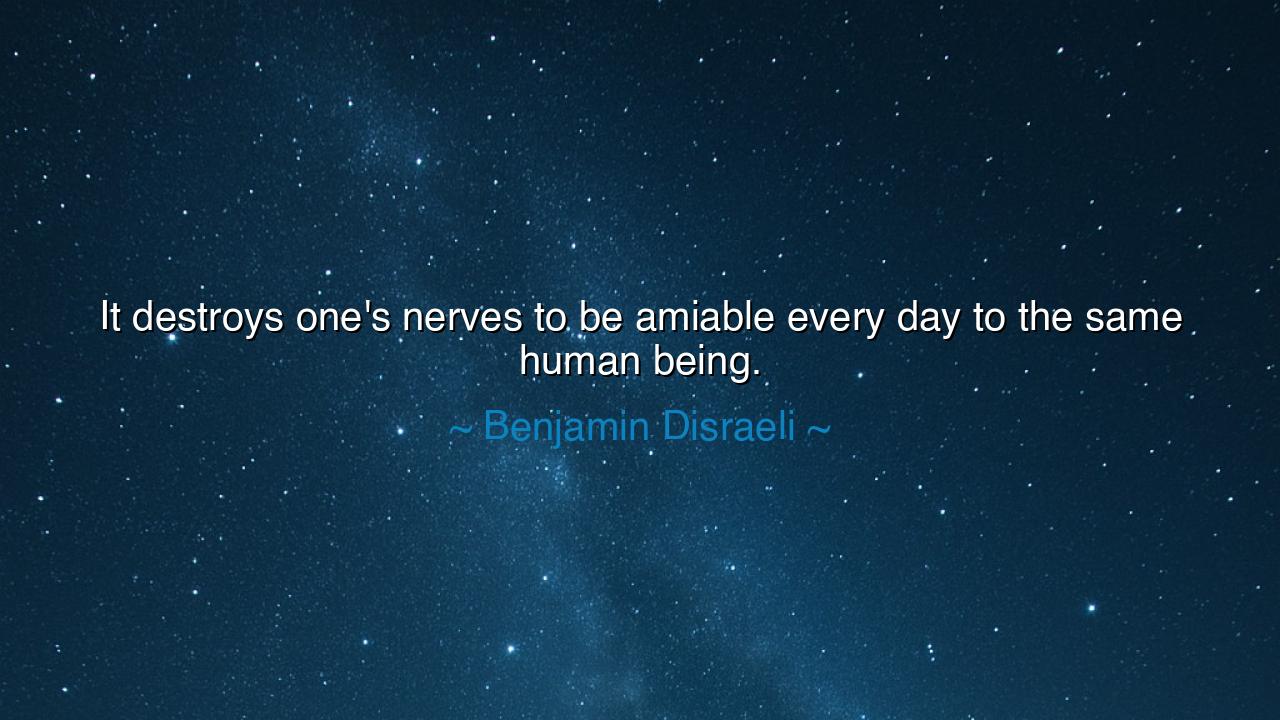
It destroys one's nerves to be amiable every day to the same






Hearken, O seekers of human truth, to the words of Benjamin Disraeli, the statesman and observer of life’s subtleties: "It destroys one's nerves to be amiable every day to the same human being." In this utterance lies the ancient wisdom that the bonds closest to us, though sacred, carry their own burdens. The repetition of forced courtesy or constant affability toward those familiar can strain the heart and spirit, revealing the delicate balance between connection and personal endurance.
In the theater of domestic and social life, many encounter the tension of proximity. Disraeli illuminates that familiarity breeds not only comfort but also the challenge of maintaining patience, kindness, and amiability. To be continually gracious toward the same individual tests the inner resources, for the soul must navigate friction, expectation, and the weight of daily presence.
The ancients, who observed the interplay of human bonds, understood that even love and friendship demand care and vigilance. The constant negotiation of temper, the practice of restraint, and the effort to sustain harmony are labor not unlike the tending of sacred gardens—necessary, fruitful, yet exhausting to the body and mind. Here, the nobility of human interaction is tested, and the discipline of the heart is forged.
Yet this teaching carries subtle depth: the strain of constant amiability does not diminish the value of the bond. Rather, it reveals the human condition, the effort required to maintain harmony, and the patience demanded by intimacy. Disraeli’s insight reminds the seeker that self-care, reflection, and understanding are essential to preserve the strength of both connection and spirit.
Therefore, O children of relationship and reflection, let this teaching lodge in your hearts: even the closest companionships demand balance between kindness and endurance. To live amiably with the same human being is both a noble challenge and a sacred test of patience. In recognizing the strain and honoring the effort, one cultivates resilience, compassion, and a deeper wisdom in the eternal art of human connection.






DLDuytan Le
This quote makes me think about the pressure to always be on, always nice, and always agreeable, especially in long-term relationships. While being amiable is generally a good thing, the quote suggests it’s draining when we’re forced to maintain that every day. But should we really be expected to be 'on' all the time? Where’s the space for vulnerability or frustration in relationships without feeling guilty?
TBBUI VAN THAI BUI
Disraeli’s words ring true in certain relationships, especially when you feel like you have to maintain a perfect facade every day. But is the real problem about being amiable, or about the expectation to be perpetually pleasant? Can we create healthier boundaries while still being kind, or do we have to sacrifice one for the other? It makes me reflect on how we can show our true selves without feeling like we’re burdened by others' expectations.
GBDang Gia Bao
I find this quote amusing, but it also raises an interesting point about the demands of constant amiability. How much of our energy do we spend trying to please others every day? Is it more draining to keep up a facade of being amiable, or to express how we truly feel? It’s a reminder that while kindness is important, it shouldn’t come at the expense of our mental well-being.
HL7A_ 14. Ha Linh
Benjamin Disraeli’s quote points to something many of us can relate to—the emotional exhaustion of being overly agreeable with someone. But I wonder, does it reflect a deeper issue of being unable to set boundaries? Could this exhaustion be a sign that we’re not being true to ourselves, or that we’re overextending in our relationships? When does politeness become a form of self-sacrifice?
PTPhuong Trang
I can relate to this quote in some ways. Maintaining politeness and friendliness all the time, especially with the same person, can definitely be taxing. But does this mean we should allow ourselves to be less amiable? Can genuine kindness become a burden? Maybe the key is being authentic and not feeling forced to constantly uphold a facade. Where do we draw the line between being considerate and losing our own peace of mind?